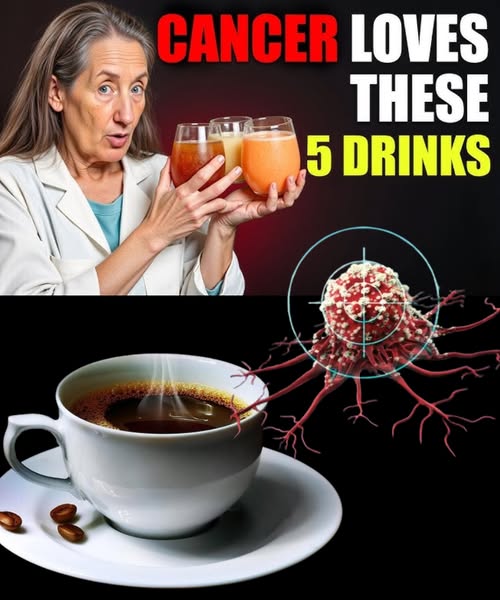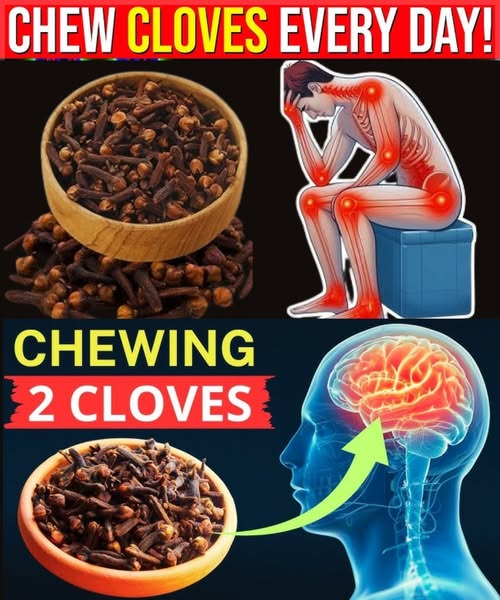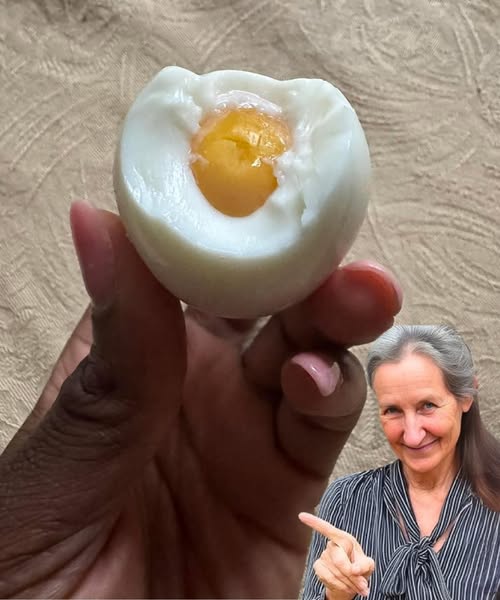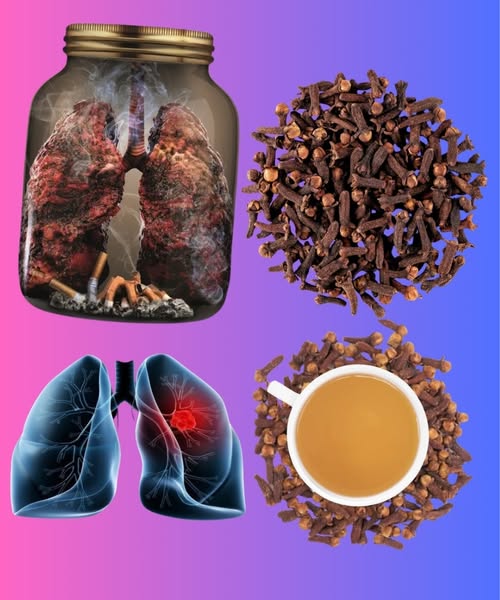Introduction: Are Your Favorite Drinks Secretly Fueling Cancer?

In a world driven by convenience and taste, many of us unknowingly sip on beverages that may do more harm than good. While you may think your drink choices are harmless—or even healthy—some common options are actually nurturing cancer cells. Yes, you read that right. Certain drinks, which millions consume daily, create the perfect environment for cancer cells to grow, multiply, and thrive.
Cancer prevention doesn’t begin in a hospital; it begins in your kitchen. The drinks you consume regularly can either strengthen your defenses—or break them down. In this article, we’ll uncover five dangerous drinks that cancer cells love and answer the most pressing questions about how your beverage habits may be increasing your risk.
This blog isn’t about fear—it’s about facts, empowerment, and making informed decisions for your long-term health.
Body: 5 Drinks That May Be Feeding Cancer Cells
1. Sugary Soft Drinks – Cancer’s Favorite Cocktail
Why it’s dangerous:
Loaded with high-fructose corn syrup and artificial colorings, sodas top the list of cancer-promoting drinks. Numerous studies have linked high sugar intake with increased inflammation, insulin resistance, and obesity—all of which are linked to cancer development.
Science says:
According to the American Institute for Cancer Research, excess sugar intake is not only a direct driver of fat gain but can also spike insulin levels—a hormone that cancer cells rely on to grow.
Cancer Connection:
- Excess sugar fuels cancer metabolism (the Warburg effect).
- High sugar consumption has been associated with an increased risk of breast, colon, and pancreatic cancers.
FAQ:
Is diet soda a better option?
Not really. Artificial sweeteners like aspartame and saccharin are controversial and have been linked to health risks, including potential carcinogenic effects in animal studies.
2. Alcohol – The Legal Poison in Disguise
Why it’s dangerous:
Alcohol is a Group 1 carcinogen, according to the World Health Organization. That means there is sufficient evidence it causes cancer in humans. Even moderate consumption increases the risk of liver, breast, esophageal, colorectal, and oral cancers.
Hard Facts:
- Alcohol breaks down into acetaldehyde—a toxic compound that damages DNA and prevents its repair.
- It also increases estrogen levels, which can fuel hormone-sensitive cancers like breast cancer.
Statistics to Know:
- The American Cancer Society reports that alcohol is responsible for about 6% of all cancers and 4% of cancer deaths in the U.S.
FAQ:
What about red wine and its “heart health” benefits?
While red wine contains resveratrol, a compound with antioxidant properties, its cancer risks outweigh any potential benefit. There are far safer sources of resveratrol, such as grapes, blueberries, or supplements.
3. Energy Drinks – A Toxic Surge of Trouble
Why it’s dangerous:
Energy drinks are packed with synthetic caffeine, sugar, and preservatives. This cocktail leads to oxidative stress, hormonal imbalance, and inflammation—key factors in cancer cell activation.
What’s Inside:
- Up to 60 grams of sugar per can
- Excessive caffeine content
- Harmful additives like guarana, taurine, and artificial dyes
Risk Amplifiers:
- Young adults and teens are especially vulnerable.
- Energy drinks can exacerbate existing conditions that lay the groundwork for cancer, such as high blood pressure and chronic inflammation.
FAQ:
Are natural energy drinks safe?
Not always. Many so-called “natural” energy drinks still contain high sugar or synthetic stimulants under the guise of “herbal extracts.” Always read the label carefully.
4. Packaged Fruit Juices – A Sweet Lie
Why it’s dangerous:
Most commercial fruit juices are glorified sugar water with minimal actual fruit content and zero fiber. This causes blood sugar spikes and encourages fat storage—conditions ideal for cancer cells.
The Hidden Truth:
- A single glass can contain as much sugar as a can of soda.
- Lacking fiber means the body absorbs sugar rapidly, increasing insulin spikes.
Research Insight:
A French study published in the BMJ linked sugary drinks, including fruit juices, to a higher risk of overall cancer, especially breast cancer.
FAQ:
What about 100% fruit juice?
Even 100% juice is not as healthy as whole fruit. While it may have vitamins, it lacks fiber and can still spike blood sugar quickly. Eat your fruit—don’t drink it.
5. Flavored Milk and Store-Bought Smoothies – The Hidden Sugar Bombs
Why it’s dangerous:
Packaged smoothies and flavored milk (think chocolate or strawberry milk) often contain added sugars, artificial flavors, and thickeners. Though they’re marketed as “healthy,” they may contribute to metabolic disorders and inflammation.
Quick Breakdown:
- A single serving can contain up to 30 grams of added sugar.
- Many contain synthetic vitamins and emulsifiers that disrupt gut health—another cancer risk factor.
Gut Health & Cancer:
Recent studies show that gut microbiome imbalance plays a significant role in colon, liver, and even breast cancers.
FAQ:
Is homemade smoothie a good alternative?
Yes—but be cautious with ingredients. Stick to leafy greens, berries, flaxseed, and minimal natural sweeteners. Avoid adding fruit juice or flavored yogurt.
Other Frequently Asked Questions
Can drinks alone cause cancer?
No. Cancer is complex and typically results from a combination of genetic, environmental, and lifestyle factors. However, repeated exposure to carcinogenic or inflammatory substances in drinks significantly increases your risk over time.
What should I drink instead?
- Water – Still the healthiest option
- Green tea – Packed with EGCG, a powerful anti-cancer antioxidant
- Herbal teas – Especially turmeric, ginger, and peppermint
- Vegetable smoothies – Low-sugar, high-fiber drinks with anti-inflammatory ingredients
How much sugar is safe per day?
The American Heart Association recommends:
- Men: No more than 36 grams (9 teaspoons)
- Women: No more than 25 grams (6 teaspoons)
Keep in mind that just one sugary drink can meet or exceed this limit.
Do cancer cells “love sugar”?
Yes, cancer cells are glucose-hungry. They rely on sugar more heavily than normal cells to fuel their rapid growth. Reducing sugar intake doesn’t cure cancer but may reduce risk and support your body’s defense systems.
Conclusion: Stop Feeding the Enemy—Take Back Control
The choices you make each day silently shape your future health. While enjoying an occasional treat is part of life, consistently consuming drinks that feed inflammation, fuel metabolic chaos, and encourage cancer cell growth is a dangerous game.
These five drinks—sugary sodas, alcohol, energy drinks, commercial fruit juices, and flavored milk/smoothies—are not just empty calories. They’re stealthy saboteurs, quietly weakening your defenses and inviting chronic disease in through the back door.
The bottom line? Read labels, cut back on sugar, opt for anti-inflammatory beverages, and stay hydrated with clean water and nutrient-dense natural drinks.
Don’t just quench your thirst—nourish your health. When it comes to cancer prevention, every sip matters.


